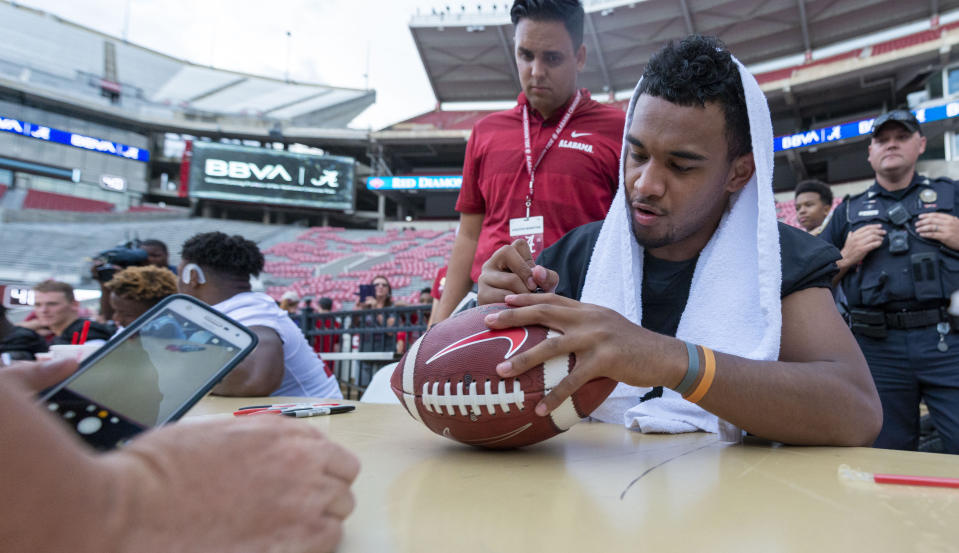Finally, NCAA will allow athletes to make money from endorsements
The term of the day for the NCAA: “modernize.”
Or maybe it was “change.” Then again, “unprecedented steps” also got plenty of time.
All were true.
After decades of digging in, battling in court, launching advertising campaigns or just shaking their collective head “no,” the NCAA’s Board of Governors has agreed to provide its athletes the same economic freedom as any other student on campus, starting in January 2021 at the latest. It still must clear a vote at the NCAA Convention, but board approval makes it all but inevitable.
“We approved legislation for student athletes to receive compensation for third-party endorsements,” said Ohio State athletic director Gene Smith.
Namely, if you can make a buck, then go make a buck (with monitoring, of course, because “guardrails” was a popular buzzword too).
There are still details to be ironed out. There are, no doubt, unexpected issues that could flare up. A priority will be given to trying to create fairness in recruiting.
Give the NCAA credit, however, it is extremely tardy to this party (the Olympics gave up enforcing “amateurism” back in the 1980s) but it made it.
Better late than stuck in another working sub-committee.
“Times have changed,” Big East commissioner Val Ackerman said. “And we believe wholeheartedly college sports needed to change as well.”
The basics are simple.
If a company wants to hire a college athlete to promote its business, it can. This can range from small to big.
A campus town Ford dealer might give an appearance fee for the star quarterback to sign autographs in the showroom and drag in some potential car buyers. If the player is popular enough — think Tua Tagovailoa — then maybe the Alabama Ford Dealers use him in commercials and billboards. If he’s really big enough, Ford Motor Co. could do something nationally.
You never know.
Essentially, Tagovailoa would have had the same opportunity to cash in on his talents and fame when he was a college student at Alabama as he now has as a professional player for the Miami Dolphins.

The player would be able to retain a marketing agent to handle the deals. The school would be separate and “guardrails” (that word again) will be put in place to keep boosters out of this in the recruiting process. Athletes also can’t use school logos or uniforms — similar to the NFL or NBA.
There’s more, of course. Social media is a monster now, so much of this may be done there rather than traditional routes. In a world where a Connecticut high schooler named Charli D’Amelio can amass 50 million-plus followers on TikTok in roughly six months — and make millions off it — whatever world the NCAA was living in was ancient.
Side businesses are allowed too. An athlete who is also a recording artist, or opens his or her own company that isn’t even sports-related, will finally be allowed.
Essentially, the best (or most popular) athletes will be able to cash in, the same way it is with Olympic athletes. Not every member of the USA Gymnastics team makes millions, but Simone Biles does and it has only aided (via marketing) not ruined her popularity.
On many campuses this is going to be football and men’s basketball players. There are plenty of opportunities in other places, though, for female and Olympic sports — a star women’s hockey player at, say, Minnesota-Duluth or a wrestler at Iowa State are still stars and potential influencers.
The NCAA finally gave up believing that their sizable rules manual could and should stop the wheels of capitalism. It also acknowledged that the days of controlling every penny in college sports is over. It deregulated.
Prior to this, if you wanted your company associated with a popular college program, you had to make a deal with that individual program, the visible head coach or the NCAA — i.e. the official car dealer of Alabama football or Nick Saban in an Aflac commercial (wearing a logoless sweater).
This isn’t the schools paying the players — any more than tuition, room and board. This is the schools no longer saying no one else can pay the players.
That embrace of the free market should weaken the problematic black market that’s dragged on college athletics for decades. And while some might think Alabama will just buy all the recruits, there are car dealers in every town in America. This should actually flatten the playing field, because Alabama already gets (almost) all the best recruits.
The NCAA didn’t come here easily, but it got here.
Years of arguing. Years of media barking. Years of athlete complaints. A lawsuit by Ed O’Bannon and spurred by former sneaker executive Sonny Vaccaro. It all led to a slow deteriorating of public opinion. Finally state politicians, led by California, came in and forced the NCAA’s hand.
On Wednesday, the NCAA officially changed its stance, a day many knew was inevitable, but always felt impossible.
More from Yahoo Sports:

